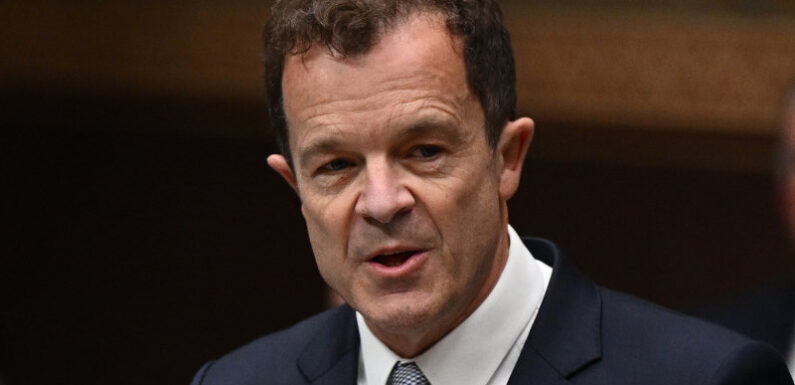
Save articles for later
Add articles to your saved list and come back to them any time.
NSW Opposition Leader Mark Speakman has used his budget reply speech to outline how the Coalition would solve the state’s housing crisis, insisting it would use a “$14 billion tax revenue windfall” on a range of measures, including stamp duty exemptions for empty nesters.
Speakman also used his first major speech as leader to outline a range of programs and projects that the Coalition says has been cut or trimmed in this week’s budget, while criticising NSW Treasury’s projections and assumptions contained in the budget papers.
These projections include an expected increase in stamp duty and payroll tax over the next four years, which will contribute to an extra $17.6 billion rolling into the state’s coffers.
NSW Opposition Leader Mark Speakman delivered his budget reply speech on Thursday, describing Labor’s budget as a lost opportunity.Credit: AAP
“It’s a budget whose predictions are not worth the glossy paper they are printed on,” Speakman told parliament on Thursday.
Speakman said the Coalition was keen to “work constructively with the government” on ways to fix the housing crisis but warned there was “not much in the budget” beyond using artificial intelligence to speed up the planning process.
He said the government’s Housing and Productivity Contribution – levied on developers to pay for key infrastructure such as water and footpaths – was a tax on new homes and apartments, while the government’s funding for public developer Landcom would do nothing to boost supply.
“The government could have done so much more to help housing affordability, but this is a budget of lost opportunities,” Speakman said. “The Coalition would not have squandered this opportunity.”
Speakman said the Coalition would have retained its land tax option for first home buyers, which was the brainchild of former premier Dominic Perrottet, and would have established a $2 billion fund to “incentivise and to reward local communities which achieved their housing targets”.
He said the fund would be available as a “carrot” to local councils and would pay for walking and cycle paths, parks, boardwalks, lookouts, foreshores, riverbanks and play spaces.
Another measure to increase supply would be to “encourage empty nesters to downsize and to free up appropriate housing supply for younger families”.
“We would have looked to introduce the stamp duty exemption with appropriate thresholds for downsizing older buyers,” Speakman said.
“This would encourage seniors to downsize to a smaller property and help them find more suitable accommodation, reducing affordability pressures by making more suitable homes available to meet the needs of younger families.”
Speakman also criticised Labor’s wages policy, warning it would cost the budget $7 billion over the next four years and would be “locked into the budget indefinitely”.
The budget revealed that employee expenses, which make up the largest component of the government’s expenses, are projected to grow by an average 4.1 per cent per annum as a result of an end to the Coalition’s wages cap.
However, Speakman said the projected rise for public sector wages was “a floor not a ceiling and wink to union mates that there is more to give”. The government gave the majority of workers an increase of 4 per cent plus 0.5 in superannuation this year, while teachers secured a historic increase of up to $10,000 from next term.
“This is a budget of missed opportunities from a government lacking vision,” Speakman said.
“This is a budget built on broken promises. This is a budget of dodgy assumptions that can’t be trusted. This is a budget that puts union mates ahead of hardworking households and families.”
Start the day with a summary of the day’s most important and interesting stories, analysis and insights. Sign up for our Morning Edition newsletter.
Most Viewed in Politics
From our partners
Source: Read Full Article
